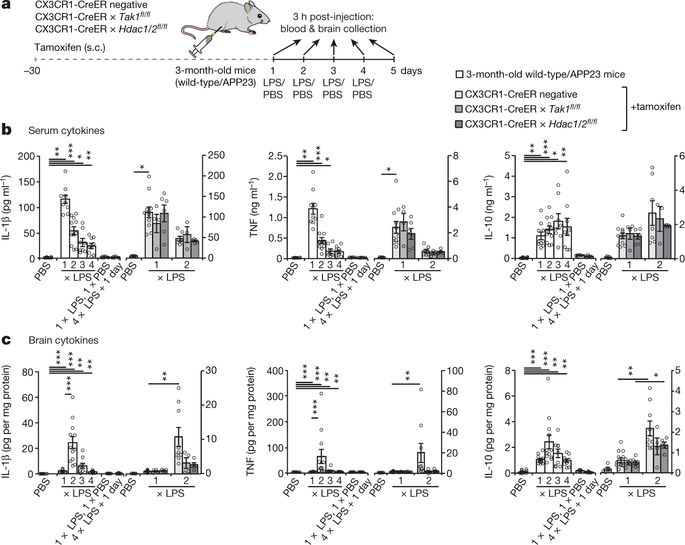Our official English website, www.x-mol.net, welcomes your
feedback! (Note: you will need to create a separate account there.)
Innate immune memory in the brain shapes neurological disease hallmarks
Nature ( IF 50.5 ) Pub Date : 2018-04-01 , DOI: 10.1038/s41586-018-0023-4 Ann-Christin Wendeln 1, 2, 3 , Karoline Degenhardt 1, 2, 3 , Lalit Kaurani 4, 5 , Michael Gertig 4, 5 , Thomas Ulas 6 , Gaurav Jain 5, 7 , Jessica Wagner 1, 2, 3 , Lisa M Häsler 1, 2 , Katleen Wild 1, 2 , Angelos Skodras 1, 2 , Thomas Blank 8 , Ori Staszewski 8 , Moumita Datta 8 , Tonatiuh Pena Centeno 5, 7 , Vincenzo Capece 5, 7 , Md Rezaul Islam 5 , Cemil Kerimoglu 5 , Matthias Staufenbiel 1, 2 , Joachim L Schultze 6, 9 , Marc Beyer 10 , Marco Prinz 8, 11 , Mathias Jucker 1, 2 , André Fischer 4, 5 , Jonas J Neher 1, 2
Nature ( IF 50.5 ) Pub Date : 2018-04-01 , DOI: 10.1038/s41586-018-0023-4 Ann-Christin Wendeln 1, 2, 3 , Karoline Degenhardt 1, 2, 3 , Lalit Kaurani 4, 5 , Michael Gertig 4, 5 , Thomas Ulas 6 , Gaurav Jain 5, 7 , Jessica Wagner 1, 2, 3 , Lisa M Häsler 1, 2 , Katleen Wild 1, 2 , Angelos Skodras 1, 2 , Thomas Blank 8 , Ori Staszewski 8 , Moumita Datta 8 , Tonatiuh Pena Centeno 5, 7 , Vincenzo Capece 5, 7 , Md Rezaul Islam 5 , Cemil Kerimoglu 5 , Matthias Staufenbiel 1, 2 , Joachim L Schultze 6, 9 , Marc Beyer 10 , Marco Prinz 8, 11 , Mathias Jucker 1, 2 , André Fischer 4, 5 , Jonas J Neher 1, 2
Affiliation

|
Innate immune memory is a vital mechanism of myeloid cell plasticity that occurs in response to environmental stimuli and alters subsequent immune responses. Two types of immunological imprinting can be distinguished—training and tolerance. These are epigenetically mediated and enhance or suppress subsequent inflammation, respectively. Whether immune memory occurs in tissue-resident macrophages in vivo and how it may affect pathology remains largely unknown. Here we demonstrate that peripherally applied inflammatory stimuli induce acute immune training and tolerance in the brain and lead to differential epigenetic reprogramming of brain-resident macrophages (microglia) that persists for at least six months. Strikingly, in a mouse model of Alzheimer’s pathology, immune training exacerbates cerebral β-amyloidosis and immune tolerance alleviates it; similarly, peripheral immune stimulation modifies pathological features after stroke. Our results identify immune memory in the brain as an important modifier of neuropathology.Peripheral stimuli can induce acute immune training and tolerance in the brain and lead to long-lasting epigenetic reprogramming of microglia; these changes alter pathology in mouse models of stroke and Alzheimer’s pathology .
中文翻译:

大脑中的先天免疫记忆塑造了神经系统疾病的标志
先天免疫记忆是骨髓细胞可塑性的重要机制,它响应环境刺激而发生并改变随后的免疫反应。可以区分两种类型的免疫印记——训练和耐受。这些是表观遗传介导的,并分别增强或抑制随后的炎症。免疫记忆是否发生在体内组织驻留的巨噬细胞中以及它如何影响病理学仍然很大程度上未知。在这里,我们证明外周应用的炎症刺激会诱导大脑中的急性免疫训练和耐受性,并导致大脑驻留巨噬细胞(小胶质细胞)的差异表观遗传重编程持续至少六个月。引人注目的是,在阿尔茨海默病病理学的小鼠模型中,免疫训练会加剧脑 β-淀粉样变性,而免疫耐受会减轻它;同样,外周免疫刺激会改变中风后的病理特征。我们的研究结果确定大脑中的免疫记忆是神经病理学的重要修饰物。外周刺激可以诱导大脑中的急性免疫训练和耐受,并导致小胶质细胞的长期表观遗传重编程;这些变化改变了中风和阿尔茨海默病小鼠模型的病理学。
更新日期:2018-04-01
中文翻译:

大脑中的先天免疫记忆塑造了神经系统疾病的标志
先天免疫记忆是骨髓细胞可塑性的重要机制,它响应环境刺激而发生并改变随后的免疫反应。可以区分两种类型的免疫印记——训练和耐受。这些是表观遗传介导的,并分别增强或抑制随后的炎症。免疫记忆是否发生在体内组织驻留的巨噬细胞中以及它如何影响病理学仍然很大程度上未知。在这里,我们证明外周应用的炎症刺激会诱导大脑中的急性免疫训练和耐受性,并导致大脑驻留巨噬细胞(小胶质细胞)的差异表观遗传重编程持续至少六个月。引人注目的是,在阿尔茨海默病病理学的小鼠模型中,免疫训练会加剧脑 β-淀粉样变性,而免疫耐受会减轻它;同样,外周免疫刺激会改变中风后的病理特征。我们的研究结果确定大脑中的免疫记忆是神经病理学的重要修饰物。外周刺激可以诱导大脑中的急性免疫训练和耐受,并导致小胶质细胞的长期表观遗传重编程;这些变化改变了中风和阿尔茨海默病小鼠模型的病理学。











































 京公网安备 11010802027423号
京公网安备 11010802027423号